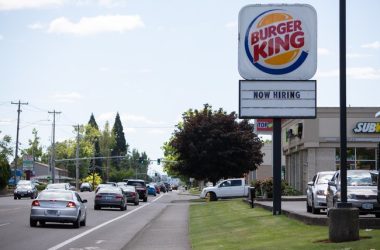As he sits drinking a smoothie at Isaac’s coffee shop in downtown Salem, Brad Compton surveys the room, narrating slices of Salem life.
At the bar is the pastor of a west Salem church who Compton knows is working on a doctorate. A local nonprofit director is deep in conversation with two other people at a table. Close to the window overlooking Southeast Commercial Street, two moms talk as their toddlers play.
“Who knows what goes on here, what work is done?” he said, a wide smile spreading over his face.
It’s exactly the scene Compton envisioned when the bank helped broker a deal to loan youth service nonprofit Isaac’s Room the money to expand the coffee shop.
For Compton, being a banker isn’t about wearing a suit (though he does, with playful ties) or scrutinizing numbers on a balance sheet. It’s about the relationships the work lets him have across Salem.
Compton, 42, was recently named president of Pioneer Trust Bank, the fifth person and fourth generation of his family to hold the job.
The bank is a rarity in the 21st century: a national bank that’s part of the Federal Reserve System, but remains in the hands of a longstanding local family after almost a century in business. It employs about 75 people in Salem.
The bank has just two branches, one mile apart – the original headquarters downtown on Southeast Commercial Street, and a branch on Southeast Oak Street just off the Salem Health campus, opened nearly 50 years ago.
“The doctors in town asked my grandpa to have a place closer to them,” Compton explained.
Compton succeeds John Wilburn as president. Wilburn will remain the bank’s CEO.
He follows in the footsteps of his uncle Mike, his father Randy, his grandfather Stuart, and his great-grandfather H.V., the bank’s founder.
Growing up, he said he was never pressured to join the family business.
“I didn’t want to wear a suit or sit at a desk. I was a people person, just wanted to be with people and make a difference,” he said.
But watching his dad, he learned that being a banker could be a way to build community in Salem.
“Everywhere I went people were shaking my dad’s hands, giving him hugs,” he said.
Many were business owners who the bank had taken a chance on with a loan or other help to get off the ground.
Still, Compton went off to college in southern California and had no intention of returning to Salem or joining the bank. He considered a career in ministry.
But in 2011, his father and uncle talked to him about coming to work, and he decided to take a job as a teller. He eventually became a loan officer and worked his way into bank leadership.
Compton said the bank’s role is to be a realist when it comes to someone’s ability to pay back a loan, but he’s often able to work with people who have a vision and coach them through creating a viable financial plan.
“A lot of these local businesses need access to capital but don’t have friends and family money to make something happen, and they don’t have a bigger bank that’s giving them the time of day,” he said. “We, as a community bank, see that as a role.”
Over the years, bank leaders have worked with many Salem nonprofits, playing a shaping role in projects around Salem.
Compton’s father became friends with the late Willie Richardson, the former president of Oregon Black Pioneers. When the nonprofit needed an office space, he offered her an upstairs room in the Pioneer building rent-free, saying he believed in their mission. The Black Pioneers kept the office for a decade.
Now, Compton says he can’t leave his west Salem home without running into someone he knows. It’s part of the job he relishes, though he doesn’t let banking interfere with family time.
For seven years, he’s gone home every day for lunch so he can spend time with his wife and two kids.
Compton said a central concern for his father, and now himself, is how the bank can grow while remaining small enough to keep its community focus.
His father started an in-house IT department as online banking grew, believing security was too important to leave to another company.
When the Covid pandemi hit, Compton said a central concern was helping bank customers navigate uncertain times as the bank worked to get federal paycheck protection program loans out the door.
“It was really like building the plane while it was in flight,” he said. Pioneer ultimately loaned $131 million, mostly to Salem businesses, and provided individual attention to help many navigate a confusing application process.
Compton says his job is to lead by example, continuing to adapt the bank’s services to deal with a changing world while staying focused on relationships.
He explains his work citing a favorite old saying: “Preach the gospel always, and when necessary, use words.”
“There’s a way to just live that out in life, in business,” he said.
Contact reporter Rachel Alexander: [email protected] or 503-575-1241.
SUPPORT OUR WORK – We depend on subscribers for resources to report on Salem with care and depth, fairness and accuracy. Subscribe today to get our daily newsletters and more. Click I want to subscribe!

Rachel Alexander is Salem Reporter’s managing editor. She joined Salem Reporter when it was founded in 2018 and covers city news, education, nonprofits and a little bit of everything else. She’s been a journalist in Oregon and Washington for a decade. Outside of work, she’s a skater and board member with Salem’s Cherry City Roller Derby and can often be found with her nose buried in a book.









